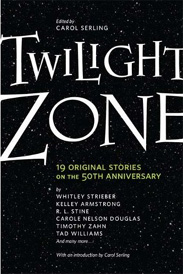| Title | Author | Synopsis |
|---|
| Genesis | David Hagberg | During World War II, an American platoon is under attack by the Japanese in the Philippines. As they strive to overtake the enemy position, one member of the platoon periodically suffers delusions that show him events in alternate times and places. |
| A Haunted House of Her Own | Kelley Armstrong | A woman purchases a country inn to market as a haunted house to tourists. Though she does not initially believe in ghosts, a series of odd events and her husband acting possessed makes her re-examine her beliefs. |
| On the Road | William F. Wu | In 1970, two hitchhikers meet by chance and promise each other to pursue their desired career paths. In the present, they unexpectedly meet again in a cafe in Texas, fulfilling a promise to meet again when one of them needs the other's help. |
| The Art of the Miniature | Earl Hamner | A man obsessed with bonsai takes revenge on his pool cleaner whom he suspects is damaging his prized plants. |
| Benchwarmer | Mike Resnick & Lezli Robyn | An imaginary friend waits to play with his real-life friend. |
| Truth or Consequences | Carole Nelson Douglas | While traveling to Truth or Consequences, New Mexico, a retired librarian becomes paranoid about a hitchhiker who seems to keep ahead of her. |
| Puowaina | Alan Brennert | A school girl in Hawaii foresees events including her father's death and a surprise attack on Pearl Harbor. |
| Torn Away | Joe R. Lansdale | A man separated from his shadow by a witch is detained by police. The man convinces the police chief to help him flee his shadow just before it attacks. |
| Vampin' Down the Avenue | Timothy Zahn | An actor frustrated by the paparazzi starts taking drugs that make him invisible to cameras at night. When he forgets to take the antidote before dawn, he suffers a day that ruins his career. |
| A Chance of a Ghost | Lucia St. Clair Robson | A woman buys a supposedly haunted walking stick on eBay. The woman and the cane become friends and they fight off a collector seeking to acquire the cane. |
| The Street that Forgot Time | Deborah Chester | The adoption of a stray dog breaks a workaholic's routine and leads him to notice that everyone in his gated community is stuck in their own routines. He escapes after discovering that someone is controlling the residents through subliminal messages on their televisions and computers. |
| The Wrong Room | R. L. Stine | A salesman checks into a hotel to attend a convention. After attending the wrong convention and being dismayed by the staff's ambivalence about not being able to leave the hotel or contact the outside world, the salesman believes he has died and is now in Hell. |
| Ghost Writer | Robert J. Serling | The President of the United States and his speechwriter discuss the tone and substance of an upcoming speech regarding the future of a divisive war. |
| The Soldier He Needed to Be | Jim DeFelice | An American soldier in Afghanistan attributes his positive change in luck and combat effectiveness to a new iPod. He becomes so reliant on the good luck charm that their fates become intertwined. |
| Ants | Tad Williams | An abusive husband kills his wife with an axe. After he cleans away the body, he uses ants which have infested their house to track down left over pieces he missed. |
| Your Last Breath, Inc. | John Miller | A reporter refuses to accept the explanation of what a new business offers and struggles to uncover a rational explanation he can accept. |
| Family Man | Laura Lippman | A manager uses family obligations as a shield against criticism for toeing the corporate line and being disloyal to his staff. His world is turned upside down when he awakens to find no trace of his family ever having existed. |
| The Good Neighbor | Whitley Strieber | A homeowner fights blockbusting by burning down the house of his new neighbor, but mistakenly kills some of the occupants. |
| El Moe | Rod Serling | A corrupt drifter is mistaken for a legendary Mexican folk hero who battled the Federales and must decide whether to become the legend or sell out to the Federales. |
